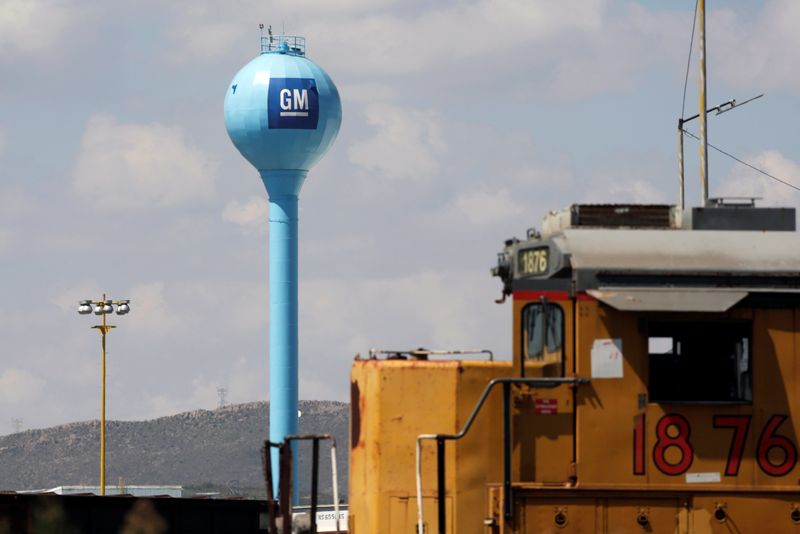By Rachit Vats and Ben Klayman
(Reuters) - General Motors Co (N:GM) and electric truck startup Nikola Corp (O:NKLA) will join forces to build electric pickup trucks and fuel cell commercial trucks to take on Tesla Inc (O:TSLA), in a deal that lifted shares in both companies on Tuesday.
As part of a multi-part, multibillion-dollar deal, GM received an 11% stake in Nikola, valued at about $2 billion. In return for the Nikola shares, GM will supply Nikola with batteries, a chassis architecture, fuel cell systems and a factory to build the startup's proposed Nikola Badger pickup. GM will also supply fuel cell technology for Nikola's planned Class 7 and 8 commercial tractor-trailers.
Shares of Nikola soared more than 48% to $52.94 after GM's investment, giving GM a paper gain of more than $500 million on its investment. GM said it expects to realize a total of $4 billion in value from the deal, including $700 million for building the Badger at one of its factories, and the value of regulatory credits for a zero emission vehicle.
GM Chief Executive Mary Barra also said the Detroit company may supply other companies with its Ultium electric battery and hydrogen fuel cell technologies.
"We are certainly open to consider additional deals as it relates to both Ultium and the fuel cell Hydrotec technology," she told reporters on a conference call.
The alliance with Nikola is the second major deal in a week for GM and highlights the pressures faced by the auto industry to share costs to meet demands for cleaner vehicles. Last week GM announced a North American alliance with Japan's Honda Motor Co (T:7267).
The agreements also signal the urgency of Barra's efforts to convince investors that GM can slash costs in its traditional, internal combustion business and develop a profitable, viable electric vehicle business.
Shares of GM, which have been stuck for months at levels below $33 a share, the price of the 2010, post-bankruptcy public offering, rose about 10% to that price in afternoon trading.
GM will receive $2 billion in newly issued Nikola stock and will get the right to nominate one director to the electric truck maker's board. I
GM's first electric pickup truck, the GMC Hummer, is due in late 2021. GM will build the electric and fuel cell versions of the Nikola Badger truck and the companies expect production by the end of 2022.
Nikola will buy GM's fuel cell systems for its Class 7 and Class 8 semi trucks. That deal runs for four years after start of production of those vehicles at a Nikola plant outside Phoenix and is exclusive except for the European market.
The companies did not say where the Nikola pickup would be built by GM. Most of GM's EVs will be built at its Detroit-Hamtramck plant.
Nikola said it expects to save $4 billion in battery and powertrain costs over 10 years and over $1 billion in engineering and validation costs.
Nikola CEO Trevor Milton said Tuesday that avoiding the cost of building a pickup truck assembly plant and developing a truck chassis was "a big deal for us." Nikola's Badger will now share major components under the skin - and a supply chain - with the GMC Hummer.
"We are going to swap out our platform for theirs," Milton said.
GM under the deal also will receive EV credits, an important factor as most of GM's vehicles are still gasoline-powered.
Barra said the companies were introduced to each other by former GM vice chairman Steve Girsky, who took Nikola public through a reverse merger with his special purpose acquisition company earlier this year. Girsky is on the Nikola board.
The Nikola truck will compete with Tesla's Cybertruck, as well as electric pickups planned by startup Rivian, Ford Motor Co (N:F) and GM itself.
Nikola claims the Badger will have a range of 600 miles, compared with the Cycbertruck's claimed range of more than 500 miles. The Cybertruck and other electric pickups have not launched yet.
Last year, GM failed to reach a deal with Rivian, which then sold a stake to Ford.

CNH Industrial (MI:CNHI) has a 7.11% stake in Nikola, through its truck unit IVECO. IVECO and Nikola are in a partnership to produce electric and hydrogen trucks.